
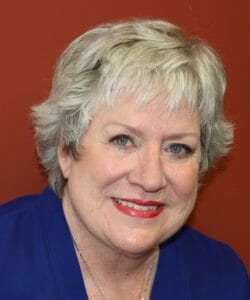
Tobin and Associates, Inc. received a Civil Monetary Penalty Grant to implement a Nurse Leadership Training Program in Ohio from January 1, 2018, to December 31, 2020. The purpose of this grant was to evaluate if training nurse leaders in team-building leadership skills would affect nursing turnover and resident and family satisfaction.
The project concentrated on developing leadership abilities that affected engagement and retention of direct care staff, such as effective communication, managing expectations, accountability, delegation and mentorship. All training sessions were conducted by experienced registered nurse facilitators.
Goals
- Decrease direct care staff turnover rate by 5% for CY 2018, with additional 1% decreases in CY 2019 and in CY 2020. Measurements were obtained by using facilities’ human resource records and documentation.
- Increase resident and family satisfaction survey scores by 7% each for CY 2018, with additional 2% increases in both surveys in CY 2019 and in CY 2020. Measurements were obtained by using special resident and family surveys developed specifically by Tobin & Associates, Inc. for this project.

The following charts (Figure 2 – Figure 5) are results received from the final evaluation questionnaire for the graduated participants. Overall, 100% of participants reported they would recommend this training program to other nurse leaders. There were a total of 144 nurses impacted by this program.
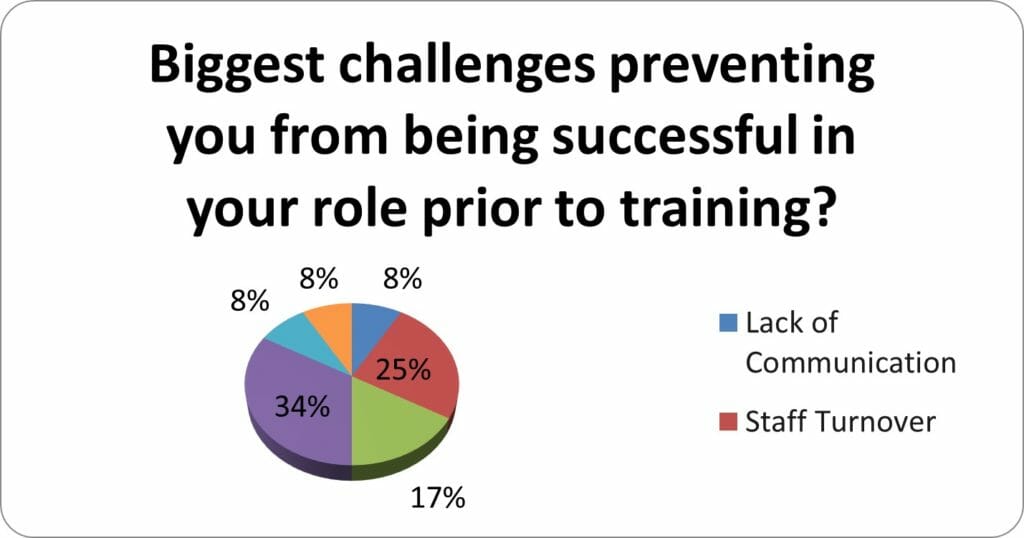
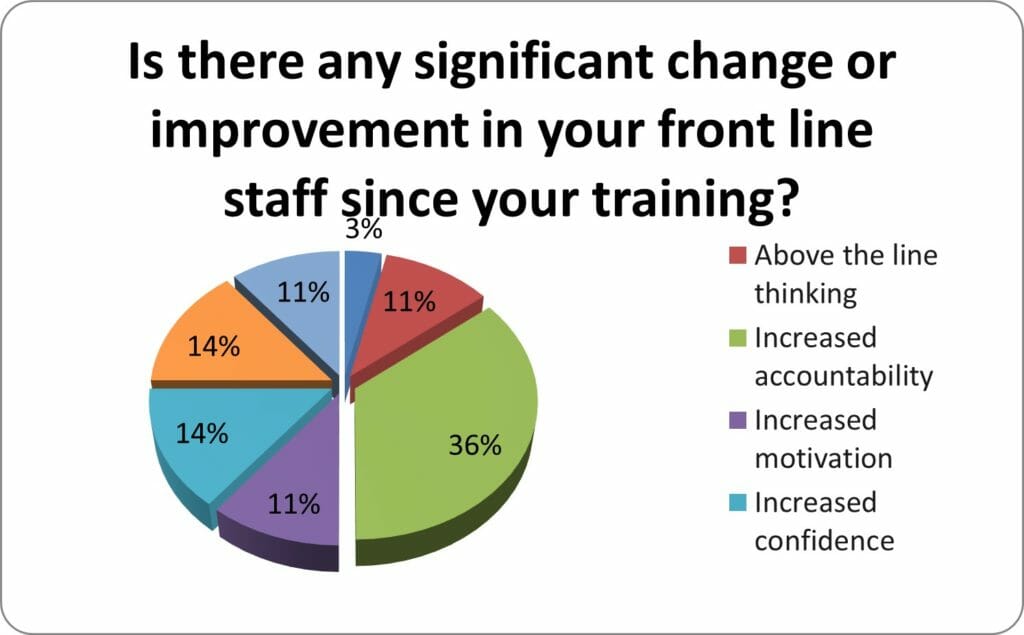
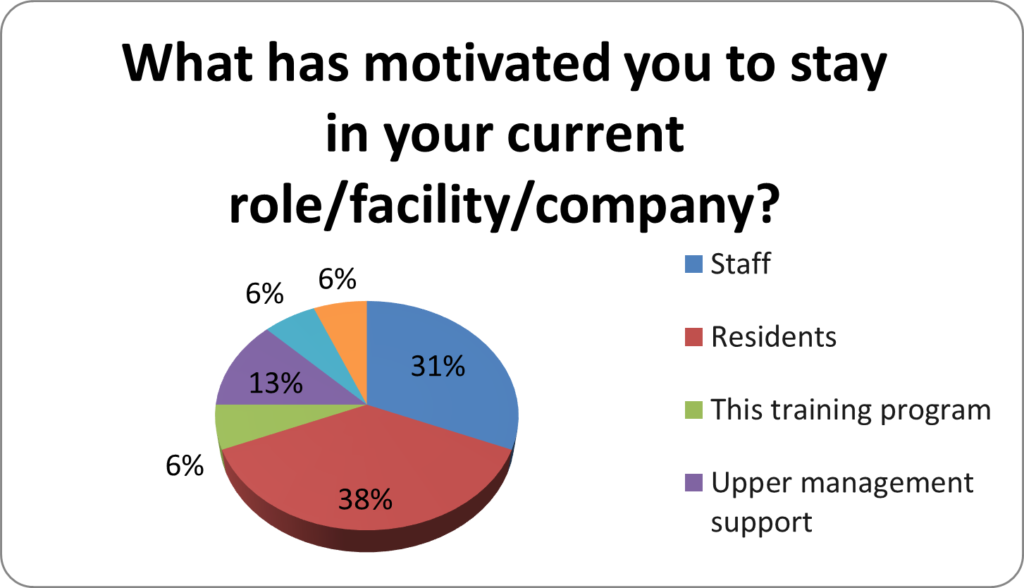
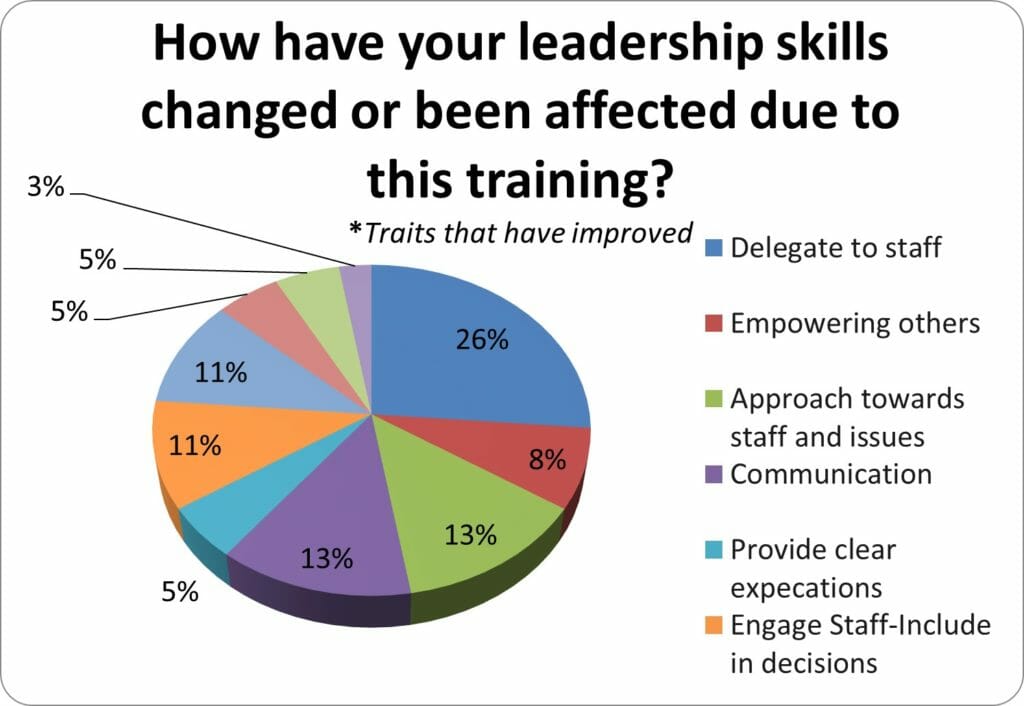
Graduates received 42.5 hours of continuing education units. Each participant earned their N.L.E.® (Nurse Leadership Executive).
Nurse leader participants were inspired to be themselves and create and implement their own unique ideas in their facilities. All participants attended in-person and live virtual training hours. Each participant received eight individual hours of one on one mentoring. This enhanced communication built rapport with the nurse leaders and the instructors that continues post-program.
The leadership curriculum covered accountability, delegation, communication, trust, emotional intelligence, perspective, challenging personalities, corporate cultures, conflict management, diversity, attracting and hiring quality assurance and survey prep, managing MDS and reimbursement, human resources, workers’ compensation, management of staff and nursing delegation. The many interactive activities utilized created a true sense of comradery among those involved.
Challenges Identified
- Getting the administrator and corporate management to agree with having their nurse leaders out of the building for the training.
- COVID-19 pandemic. The pandemic had a direct impact on resident and family satisfaction rates due to the inability of family members to visit or talk with their families (residents).
- The isolation factor affected the residents’ ability to socialize, eat or do certain activities with other residents.
- The need to convert the in-person training to virtual class meetings at the beginning of 2020.
- Mid-2020 initiated recommended social distancing protocols and class sizes so we were able to resume in-person classes again.
Byproducts
Some nurse leader participants:
- Created a CNA committee based on tools/ideas, thus creating leadership within their role, which provided inclusion with the management team.
- Had their management staff leave their offices every two hours to acknowledge floor staff and residents along with answering any call lights if needed.
- Implemented the AIDET patient communication system in their facility. They placed this on every resident door.
- Did a cost analysis of the surrounding communities for nurse assistant hourly wages, and provided this to the corporate team. The analysis provided cost savings which lead to an increase in pay across the board based on years of employment with facility vs. overtime hours and agency usage costs.
- Started a Facebook page called Directors of Nursing/ADON, which currently has 5,200 members across the United States. This page has become a successful and growing resource for nurse leaders everywhere.
Administrators of participating facilities reported impressive improvement in communication, observation and delegation skills. Nurses were energized towards leadership and staff development.
Project Measurements




The Nurse Leadership Program surpassed its set goals!
Conclusion
Nurse leadership training plays a critical role in promoting nurse work engagement and nursing staff retention. Nurse leaders, who continued to exercise the strategies of being available and accessible to nursing staff, practiced open communication, took a personal interest in staff, and experienced less burnout, incivility, turnover and staff shortages, leading to a higher quality of patient care. Investment in nursing staff is vital to improvements in culture, leading to the best outcomes for residents and families, and a positive fiscal bottom line for facilities. Valuing professional growth can go a long way in maintaining workplace cultures that are respectful, thriving and healthy.
Acknowledgments
We would like to thank the facilities and nurse leaders who took the time to attend this training and study course, especially those who attended during the year 2020 while navigating through the COVID-19 pandemic. A special thank you to EFOHCA for providing the nurse participants with BELTSS approved CEU hours.
Peg Tobin, RN, is the owner and president of Tobin & Associates, Inc., as well as an author, leadership coach, keynote and international leadership speaker, and grant writer.
The opinions expressed in McKnight’s Long-Term Care News guest submissions are the author’s and are not necessarily those of McKnight’s Long-Term Care News or its editors.




